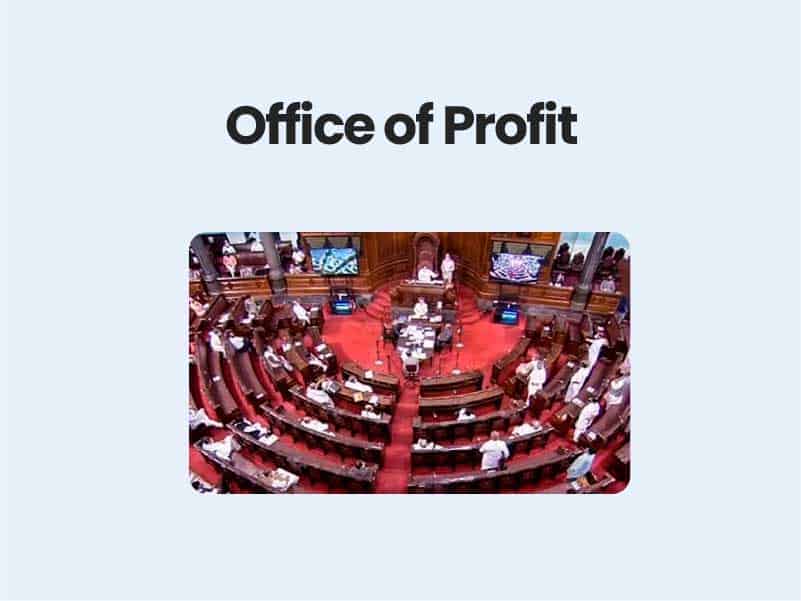Companion@360 → 7 Month programme to sharpen your writing skills → REGISTER NOW

Office of Profit
In the most recent ‘office of profit’ controversy, The Andhra Pradesh government protected its MP from the ‘office of profit’ rulebook by moving an ordinance. The MP was appointed as special representative of the state. The matter was pending with the Parliament’s Joint Committee. The President has now referred the matter to the Election Commission.
‘Office of profit’ has been doing the rounds in the news earlier when the President disqualified 20 MLAs of the Delhi Legislative Assembly for being appointed as parliamentary secretaries. There have been reports of parliamentary secretaries being appointed in 20 states in the past with court judgments striking down these appointments in several cases.
What is the constitutional provision regarding the Office of Profit?
- Article 102(1), among other provisions, provides for the disqualification of a member of either House of Parliament if he holds any office of profit under the Government of India or the Government of any State, other than an office declared by Parliament by law not to disqualify its holder.
- Article 191(1), among other provisions, provides for the disqualification of a member of the Legislative Assembly or Legislative Council of State if he holds any office of profit under the Government of India or the Government of any State specified in the First Schedule, other than an office declared by the Legislature of the State by law not to disqualify its holder.
- The articles clarify that “a person shall not be deemed to hold an office of profit under the government of India or the government of any state by reason only that he is a minister”.
- Parliament has enacted the Parliament (Prevention of Disqualification) Act, 1959, to exempt officers from disqualification. Several states also have enacted similar laws.
- There is no bar on how many offices can be exempted from the purview of the law.
- The President, in consultation with the Election Commission, disqualifies a member who is holding an office of profit.
What is the basis of the disqualification provision?
- Members of Parliament and State Legislatures have a responsibility to hold the government accountable for its actions. If legislators hold an ‘office of profit’ under the government, they might be susceptible to government influence, and may not discharge their constitutional mandate fairly.
- The law intends to eliminate any conflict of interest – hence enforces the principle of separation of powers between the legislature and the executive.
What is Office of Profit ?
- ‘Office of Profit’ is not defined in the constitution or any other statute. Its current definition is derived from interpretations made in various court judgments.
- An office of profit has been interpreted to be a position that brings to the office-holder some financial gain, or advantage, or benefit.
- In 1964, the Supreme Court laid down the test of appointment (Gurugobinda Basu vs Sankari Prasad Ghosal case) to determine an office of profit; it considers the following:
- whether the government is the appointing authority,
- whether the government has the power to terminate the appointment,
- whether the government determines the remuneration,
- what is the source of remuneration, and
- the power that comes with the position.
Read Also Agroecology
Issue of appointing parliamentary secretaries
Recent instances
- The Nagaland Chief Minister appointed 26 legislators as parliamentary secretaries in 2017 after all the 60 MLAs of the Nagaland Assembly joined the ruling alliance.
- Goa exempted more than 50 offices by means of an ordinance in 2017. Similarly, Puducherry exempted more than 60 offices.
- In Delhi, 21 parliamentary secretaries were appointed in addition to the seven ministerial posts to constitute 40% of the 70-member legislature.
Issues
- It is against the separation of powers – holding offices makes a legislator dependent on the executive
- It is in violation of constitutional provisions – such as a ceiling on the number of ministers
- It is misused for political reasons – the coalition politics era has led to appeasing members by giving attractive positions.
- Financial burden – they cause losses to public money because of
- A larger size of government and arbitrary use of legislative power
- The appointment of legislators as parliamentary secretaries, despite the office being exempted from the purview of the office of profit law, has been struck down by courts in several states. This is because the courts found that it was an attempt by state governments to bypass the constitutional ceiling on the number of ministers.
Important Court Judgements
Jaya Bachchan Case (2006)
- The Supreme Court, while upholding the disqualification of Jaya Bachchan from Rajya Sabha, held that office of profit is relevant if the office is capable of yielding profit or pecuniary gain and not whether the person actually obtained a monetary gain. However, it exempt reimbursement of out of pocket or actual expenses from gains.
- It also exempts, acquiring a contractor licence from the government to perform functions, which government would have itself discharged.
Calcutta High Court judgment (Vishak Bhattacharya vs The State Of West Bengal) 2015
- The Court held that the position of Parliamentary Secretary may confer the rank of a junior minister on the legislator, and hence was an attempt by state governments to bypass the constitutional ceiling on the number of ministers.
Bombay High Court judgement 2009
- It held that appointing parliamentary secretaries of the rank and status of a Cabinet Minister is in violation of Article 164 (1A) of the Constitution, which specifies that the number of ministers including the Chief Minister should not exceed 15% of the total number of members in the assembly.
Way Forward
- The Constitution or Representation of the People Act should be amended to include a holistic definition of Office of Profit.
- Some suggestions by various committees should be considered
- The Parliament’s Joint Committee on Office of Profit has suggested additional parameters like remuneration, powers, patronage to determine Office of Profit.
- The 2nd ARC has recommended that all offices with executive decision-making powers and financial control to be treated as an office of profit.
- The National Commission to Review the Working of the Constitution suggested that the Election Commission should be given the mandate to determine the offices of profit.
- India can also follow the English practise of determining if an office constitutes an office of profit or not at the time of the creation of an office.
Read Also Scheduled Tribes


